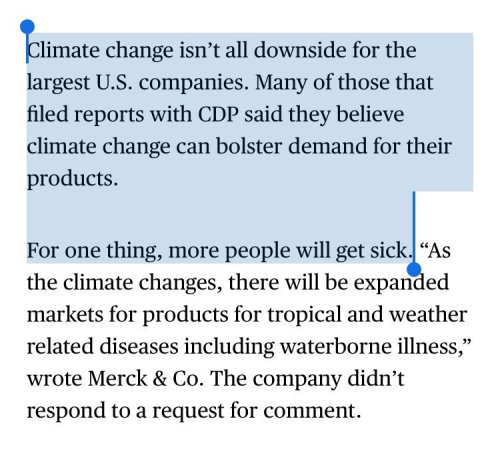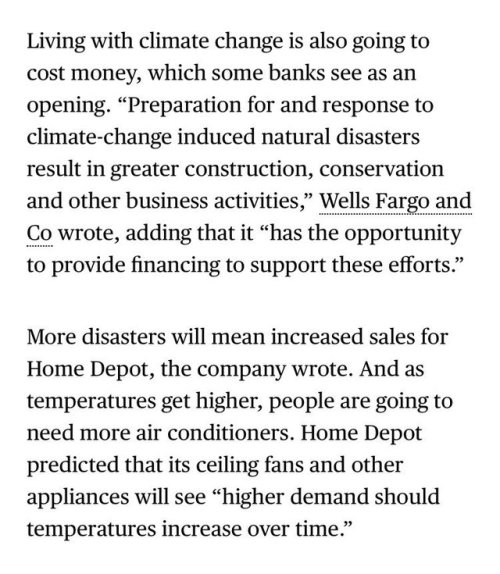You Know Of Any Examples Of Wintry Solarpunk?
You know of any examples of wintry Solarpunk?
I’m not sure how all of the logistics would work (I’m more of a sociology guy than a STEM guy), but I don’t see why a colder climate wouldn’t be able to take advantage of renewable energy sources – geothermal and perfected solar technology and such.
Aesthetically, you’d probably end up with something very similar to the “Northern Lights glass igloos” in Finland:




Maybe connect all the igloos with a tunnel/tube system and have them all link up to a big hub at the center. Maybe the hub has advanced solar panels and sits on a geothermal hot spot, and the energy accumulated there could power the surrounding homes and buildings.
People can and should add to this, because my winter solarpunk imagination is a tad limited.
More Posts from Green-notebooks and Others
This is truly incredible.
The vegan to ecofascist pipeline
Shoutout to the people that work back breaking labor jobs so we can eat. Nothing but respect for them.
i think some of the phrasing we use when discussing human environmental impact wrt energy production and agriculture and human habitation can influence the way we think about these things
when we discuss certain energy production methods or agricultural methods or architectural methods or any other elements of human habitation of a given area as “disruptive” to the environment, without sufficient context for what that means, it sets up this dichotomy where our habitation is either disruptive to the environment OR has no effect on the environment, and i think for many reasons thats obviously not a healthy or realistic way to frame it
as human beings, we are organisms, we are part of nature, we are PART of our environment, we are not separate from it, we are not above it. human habitation of an environment will have effects on our environment, in much the same way that ANY organism inhabiting an environment will necessarily affect its environment
so framing it as “are we going to be disruptive to the environment in the way we inhabit this space, or are we going to leave the environment be” is, in a way, setting us up for failure from the start. as long as humans live and exist in an environment, we WILL have an impact, so we need to question what kind of impact we want to have, what kind of an impact were willing to have
this isnt to say that things we do that are normally called disruptive to the environment are suddenly all okay, or that everyone calling them bad is engaging in this kind of dichotomy. hydroelectric power is often called disruptive and it IS, it has massive detrimental effects on local ecosystems, monoculture farming is called disruptive and it IS, this is not apologia for these systems
but i think when discussing possible solutions and alternatives, it often gets framed as “well, will this have an environmental impact, cause we dont wanna have an environmental impact” and im sorry but the answer is that any large scale energy production, any large scale food production, any large scale human habitation IS going to have an environmental impact, its not a question of impact or not, its a question of what kind of impact, how will this impact local species, how will this impact climate, how will this impact local weather systems, how will this impact soil, how will this impact erosion, its COMPLICATED
and the impact isnt always negative, we as humans can provide for ourselves and help shape the world we live in in ways that are BENEFICIAL to the world around us
we can live in harmony with nature, but living in harmony with the world doesnt mean isolating ourselves from cause and effect





“One of the biggest reasons our personal lifestyle choices matter when it comes to the climate crisis is that what we do changes us. And the other big reason is that what we do and say changes others, too.” Behavioral contagion is a real psychological phenomenon and it spreads at a much faster rate than you would imagine. In fact, behavioral contagion can be a much more effective way of getting people to change their behavior than rationally explaining to them why a particular change is in their best interest. When people say that personal changes still matter, this is the kind of thing they are talking about. Yes, maybe one person recycling or adopting solar panels or building a pollinator garden in their backyard doesn’t do much in the scheme of the greater problem, but many of these small actions together can build into something that really, really does. Even small, personal changes matter, because taking action to fight climate change changes you and it changes your community.
Actually you know what. Just don’t mow. Get rid of your lawnmower. Turn your whole yard into a wildflower field or an edible garden. Lawns are the invention of the upper class to show wealth through wasted plots of grass that is meticulously tended for no reason other than to be grass. It’s literally an empty plot of land they kept because they had so much money they didn’t need it to grow food. Not using a yard as just a yard is an act of rebellion.
One of the main industries still supporting lawns is chemical pest control companies, and they’re also responsible for the insecticides that crashed the bird populations in the 40s and 50s as well as a lot of what’s killing bees and butterflies now. The herbicides they produce specifically targets “bad” plants like dandelions, buttercups, and clovers, which are plants bees rely on for early spring feeding. Grass is just grass; it would be great for feeding small mammals if people would let it grow more than three inches, but they won’t.
So, yeah. Kill lawnmower culture. Plant some native flowers. Grow some vegetables and fruit trees. Put out bird feeders and bee sugar spots and homes for both. Be kind to bugs and birds and rabbits and opossums and whoever else might wander by. Make your neighborhood a lot more beautiful.
-
 hollow-port reblogged this · 6 months ago
hollow-port reblogged this · 6 months ago -
 hollow-port liked this · 6 months ago
hollow-port liked this · 6 months ago -
 uinuvien liked this · 6 months ago
uinuvien liked this · 6 months ago -
 pls-readnowayu liked this · 11 months ago
pls-readnowayu liked this · 11 months ago -
 iamthatswimmerguy reblogged this · 1 year ago
iamthatswimmerguy reblogged this · 1 year ago -
 iamthatswimmerguy liked this · 1 year ago
iamthatswimmerguy liked this · 1 year ago -
 secondaristh reblogged this · 1 year ago
secondaristh reblogged this · 1 year ago -
 rainbow-nerd-13 liked this · 1 year ago
rainbow-nerd-13 liked this · 1 year ago -
 foggyjune liked this · 1 year ago
foggyjune liked this · 1 year ago -
 your-local-shapeshifting-witch liked this · 1 year ago
your-local-shapeshifting-witch liked this · 1 year ago -
 straypotatoes reblogged this · 1 year ago
straypotatoes reblogged this · 1 year ago -
 persimmonteas reblogged this · 1 year ago
persimmonteas reblogged this · 1 year ago -
 bumblebeeappletree reblogged this · 1 year ago
bumblebeeappletree reblogged this · 1 year ago -
 darkbarbarianparadise liked this · 1 year ago
darkbarbarianparadise liked this · 1 year ago -
 smua70 reblogged this · 1 year ago
smua70 reblogged this · 1 year ago -
 biestcallisto reblogged this · 1 year ago
biestcallisto reblogged this · 1 year ago -
 blackholeinyoursoul liked this · 1 year ago
blackholeinyoursoul liked this · 1 year ago -
 redlegotwobyfour reblogged this · 1 year ago
redlegotwobyfour reblogged this · 1 year ago -
 bumblebeeappletree reblogged this · 1 year ago
bumblebeeappletree reblogged this · 1 year ago -
 straypotatoes liked this · 1 year ago
straypotatoes liked this · 1 year ago -
 tabkatta reblogged this · 1 year ago
tabkatta reblogged this · 1 year ago -
 biestcallisto liked this · 1 year ago
biestcallisto liked this · 1 year ago -
 cascadianights liked this · 1 year ago
cascadianights liked this · 1 year ago -
 belladonna-and-the-sweetpeas reblogged this · 1 year ago
belladonna-and-the-sweetpeas reblogged this · 1 year ago -
 ilaeriawitch reblogged this · 1 year ago
ilaeriawitch reblogged this · 1 year ago -
 feralpigeons reblogged this · 1 year ago
feralpigeons reblogged this · 1 year ago -
 moriartyyouwhore liked this · 1 year ago
moriartyyouwhore liked this · 1 year ago -
 chooseyourgods liked this · 1 year ago
chooseyourgods liked this · 1 year ago -
 macgyvermedical liked this · 1 year ago
macgyvermedical liked this · 1 year ago -
 excali8ur liked this · 1 year ago
excali8ur liked this · 1 year ago -
 husgroda liked this · 1 year ago
husgroda liked this · 1 year ago -
 starryrituals liked this · 1 year ago
starryrituals liked this · 1 year ago -
 cosmicsnufkin liked this · 1 year ago
cosmicsnufkin liked this · 1 year ago -
 mossmerized reblogged this · 1 year ago
mossmerized reblogged this · 1 year ago -
 ladytimetraveller liked this · 1 year ago
ladytimetraveller liked this · 1 year ago -
 enekorre reblogged this · 1 year ago
enekorre reblogged this · 1 year ago -
 random-autie-fangirl reblogged this · 1 year ago
random-autie-fangirl reblogged this · 1 year ago -
 fennopunk reblogged this · 1 year ago
fennopunk reblogged this · 1 year ago -
 lovelyfate liked this · 1 year ago
lovelyfate liked this · 1 year ago -
 ask-terracotta-jade liked this · 1 year ago
ask-terracotta-jade liked this · 1 year ago -
 askprosecutie liked this · 1 year ago
askprosecutie liked this · 1 year ago -
 themarvelhorse reblogged this · 1 year ago
themarvelhorse reblogged this · 1 year ago -
 themarvelhorse liked this · 1 year ago
themarvelhorse liked this · 1 year ago -
 booksnscience liked this · 1 year ago
booksnscience liked this · 1 year ago -
 evyor reblogged this · 1 year ago
evyor reblogged this · 1 year ago -
 siri-of-all-trades reblogged this · 1 year ago
siri-of-all-trades reblogged this · 1 year ago